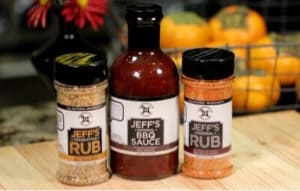- Oct 6, 2012
- 26
- 11
I recently decided to try dry brining and my first attempt was with chicken breast.
I trimmed down the slightly larger one to be as close as possible to the smaller one. By weight and size they were very close (~5%).
I used 1/4 tspn salt per pound (450 gm) of meat on one breast. as suggested by Meathead from amazing ribs. I did not brine the other. I left them for maybe 4:30 hrs in the fridge, in a zip bag (told to do that so as to not dry out the chicken).
I then cooked them both in the same SV bath for 2 hours at 56C, then 45 minutes at 61C, just to bring them up to acceptable "cookedness" (I would go to 62C next time). When they were done I did not ice bath them, but put them in the freezer for about 15-20 minutes. I then put them in the fridge.
The result of a blind test by my wife was that she instantly picked the brined bit, because we eat no salt in my cooking and very little at other times. I could also taste it, even when I carefully selected a piece that had no surface meat on it.. Because of our low salt diet, we will at least need some tries to describe it as "flavour"...however.
We both found the brined piece to seem _more_ cooked than the other bit. It was softer and had less setructure...bite...to it. It did not seem markedly juicier. The non-brined piece was "zippy" to bite, but was definitely not raw inside. For the first time my wife said it was close to seeming undercooked and she has never said that.
So. Anyone got any idea about why the brined breast was softer and not juicier; why it seemed more cooked for exactly the same cook time and temp?
Don't get me wrong. They were both still stunning to eat. I am just curious of others' experience and theories.
Looking forward to ideas, with gratitude.
Nick
I trimmed down the slightly larger one to be as close as possible to the smaller one. By weight and size they were very close (~5%).
I used 1/4 tspn salt per pound (450 gm) of meat on one breast. as suggested by Meathead from amazing ribs. I did not brine the other. I left them for maybe 4:30 hrs in the fridge, in a zip bag (told to do that so as to not dry out the chicken).
I then cooked them both in the same SV bath for 2 hours at 56C, then 45 minutes at 61C, just to bring them up to acceptable "cookedness" (I would go to 62C next time). When they were done I did not ice bath them, but put them in the freezer for about 15-20 minutes. I then put them in the fridge.
The result of a blind test by my wife was that she instantly picked the brined bit, because we eat no salt in my cooking and very little at other times. I could also taste it, even when I carefully selected a piece that had no surface meat on it.. Because of our low salt diet, we will at least need some tries to describe it as "flavour"...however.
We both found the brined piece to seem _more_ cooked than the other bit. It was softer and had less setructure...bite...to it. It did not seem markedly juicier. The non-brined piece was "zippy" to bite, but was definitely not raw inside. For the first time my wife said it was close to seeming undercooked and she has never said that.
So. Anyone got any idea about why the brined breast was softer and not juicier; why it seemed more cooked for exactly the same cook time and temp?
Don't get me wrong. They were both still stunning to eat. I am just curious of others' experience and theories.
Looking forward to ideas, with gratitude.
Nick




